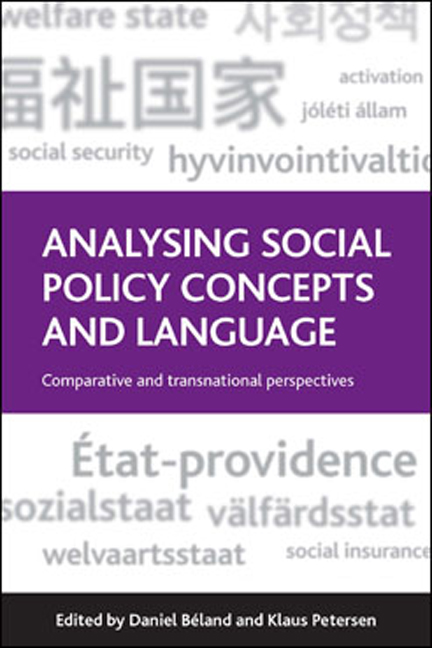Book contents
- Frontmatter
- Contents
- List of figures and tables
- Acknowledgement
- Notes on contributors
- Introduction: social policy concepts and language
- one Social policy language in Denmark and Sweden
- two The changing language of social policy in Hungary and Polan
- three Languages of ‘social policy’ at ‘the EU level’
- four The OECD's search for a new social policy language: from welfare state to active society
- five The discursive power of international organisations: social policy language and concepts in the World Bank and the International Monetary Fund
- six Original and imitated or elusive and limited? Towards a genealogy of the welfare state idea in Britain
- seven Social policy concepts and language in France
- eight The language of social politics in Finland
- nine Germany: constructing the ‘win-win’ society
- ten Conceptual development of welfare and social policy in Japan
- eleven Transition to the ‘universal’ welfare state: the changing meaning of ‘welfare state’ in Korea
- twelve The Dutch ‘caring state’
- thirteen Panacea, problem or perish: social policy language in New Zealand
- fourteen Evolving social policy languages in Spain: what did democracy and EU membership change?
- fifteen Social policy language in the United States
- Conclusion: comparative perspectives on social policy language
- Index
six - Original and imitated or elusive and limited? Towards a genealogy of the welfare state idea in Britain
Published online by Cambridge University Press: 04 March 2022
- Frontmatter
- Contents
- List of figures and tables
- Acknowledgement
- Notes on contributors
- Introduction: social policy concepts and language
- one Social policy language in Denmark and Sweden
- two The changing language of social policy in Hungary and Polan
- three Languages of ‘social policy’ at ‘the EU level’
- four The OECD's search for a new social policy language: from welfare state to active society
- five The discursive power of international organisations: social policy language and concepts in the World Bank and the International Monetary Fund
- six Original and imitated or elusive and limited? Towards a genealogy of the welfare state idea in Britain
- seven Social policy concepts and language in France
- eight The language of social politics in Finland
- nine Germany: constructing the ‘win-win’ society
- ten Conceptual development of welfare and social policy in Japan
- eleven Transition to the ‘universal’ welfare state: the changing meaning of ‘welfare state’ in Korea
- twelve The Dutch ‘caring state’
- thirteen Panacea, problem or perish: social policy language in New Zealand
- fourteen Evolving social policy languages in Spain: what did democracy and EU membership change?
- fifteen Social policy language in the United States
- Conclusion: comparative perspectives on social policy language
- Index
Summary
Britain occupies a pivotal and peculiar position in the historiography of the welfare state, looming large in the dominant – largely taken for granted – periodisation of welfare state history. Structured around a (roughly) thirty-year ‘golden age’ after 1945 (Wincott, 2013), the iconography of this metanarrative begins and ends with Britain. So ‘British reforms introduced between 1945 and 1948’ ‘designed the first coherent and systematic architecture of a universalisticwelfare state’ (Ferrera, 2005: 64, emphasis added). While its precise endpoint is harder to date, Margaret Thatcher's assumption of the British premiership often appears as a decisive moment in the welfare state's demise. Claims about the origins of social policy language and concepts reflect or embody these assumptions: writing in the early 1960s (during the supposed heyday of welfare statism), distinguished social historian Asa Briggs asserted that the ‘phrase “welfare state” … was first used to describe labour Britain after 1945. From Britain the phrase made its way round the world’ (1961: 221).
Today, claims of historic British patrimony over the concept of the welfare state have a peculiar quality. They do not seem to ring true. Specialists may quibble over the precise dates, but we have now lived through a period of post (‘golden age’) welfare statism longer than the putative ‘golden age’ itself. After this long denouement, the British welfare state now looks as if it was always comparatively limited, niggardly and ‘ungrounded’ (Dunleavy, 1989), making it hard to believe that Britain was ever (perceived) to have been the world leader. This sense that the chain of history is broken – that the past does not link to the present – may reflect a tendency towards anachronism in welfare state analysis. Elsewhere, the present author has analysed the fallacious assumption that the cluster of concepts adhering to the welfare state today can be projected back into history and had the same resonance, meaning and significance to contemporaries as they have today (Wincott, 2011, 2013). There are strong tendencies towards the fallacy of anachronism in most comparative welfare analysis. Even so, there is something especially peculiar about the British case.
- Type
- Chapter
- Information
- Analysing Social Policy Concepts and LanguageComparative and Transnational Perspectives, pp. 127 - 142Publisher: Bristol University PressPrint publication year: 2014
- 1
- Cited by

